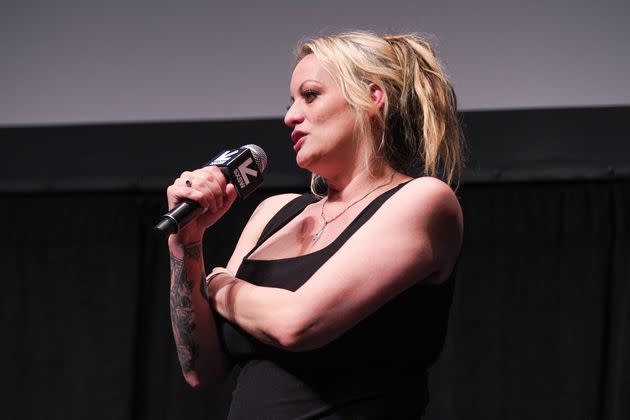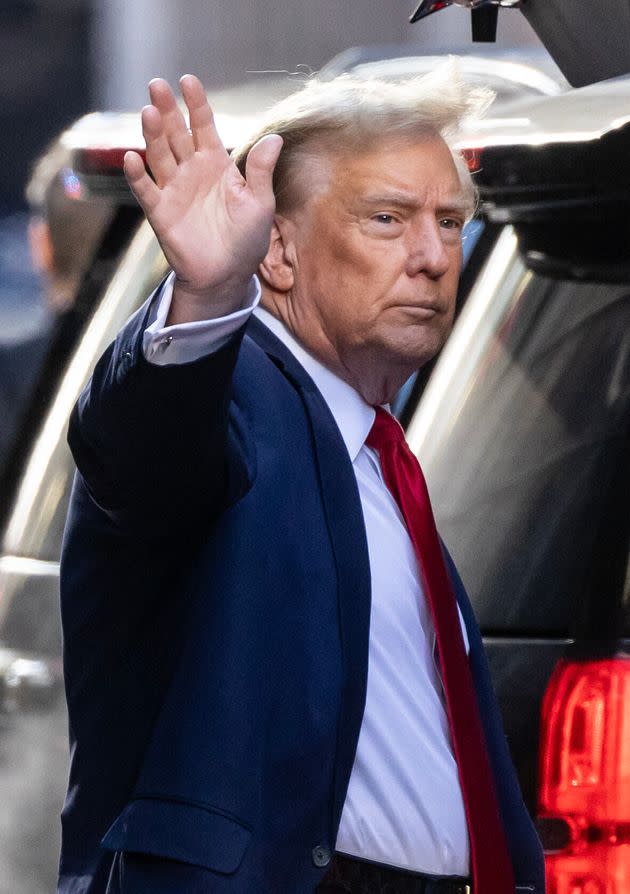Donald Trump Loses Bid To Block Testimony From Stormy Daniels And Michael Cohen In Hush Money Trial
A judge overseeing former President Donald Trump’s trial for allegedly paying hush money ahead of the 2016 election quashed Trump’s bid to block testimony from his former lawyer Michael Cohen and porn actress Stormy Daniels on Monday.
Trump had sought to prevent testimony from or about Cohen and Daniels by claiming their testimony would be immaterial to the case in an earlier filing with the court. New York Judge Juan Merchan firmly rejected this effort, arguing the two witnesses are essential to the narrative surrounding the charges Trump faces related to the hush money payments and subsequent falsification of business records to hide them.
In addition, Merchan allowed prosecutors to discuss, but not show, the “Access Hollywood” tape famously released one month prior to the 2016 election. The tape revealed Trump boasting about how his celebrity allowed him to sexually assault women as he pleased, and its discovery was a key event leading Trump’s inner circle to make the alleged hush money payments.
The case brought by Manhattan District Attorney Alvin Bragg revolves around Trump’s effort to prevent two women who alleged affairs with him and a former Trump Tower doorman from going public with allegations about his extramarital affairs by purchasing the rights to their stories.
Daniels claims to have had sex with Trump after meeting him at a golf course in 2006. Karen McDougal, an actress, also alleged she had an affair with Trump from 2006 to 2007. Dino Sajudin, the ex-doorman, wrote a book alleging that Trump fathered a child with an employee in the late 1980s.
The stories of all three were purchased by either Cohen or American Media, Inc., the parent company of The National Enquirer, from 2015-2016 as part of an alleged “catch-and-kill” scheme orchestrated by Trump, Cohen and AMI’s David Pecker to protect Trump from negative press as he ran for president. The case against Trump alleges that the former president falsified business records and broke campaign finance laws as part of the scheme.

While Merchan ruled Cohen and Daniels may testify, he put limits on the testimony from McDougal and Sajudin. Their testimony must be limited to “the fact of” the case — the payments made to them — but “may not explore the underlying details of what allegedly transpired between those individuals and [Trump.]”
Trump also sought to quash Cohen’s testimony by claiming he is “a liar” who “committed perjury.” The judge also rejected this motion, arguing that, “The Court is unaware of any perjured testimony that Cohen has provided in the instant matter.”
The decision from Merchan included further losses for Trump’s motion to limit evidence and arguments that the prosecution could use against him.
Merchan struck down Trump’s motions to prevent the prosecution from discussing the relationship between the alleged hush money payments and the 2016 election, the “catch-and-kill” scheme and whether Trump had an intent to defraud in the preparation of records surrounding the payments.
Additionally, the court rejected Trump’s efforts to block the prosecution from introducing the former president’s statements, notes prepared by Trump’s convicted chief financial officer Allen Weisselberg and any discussion of AMI’s records noting the alleged hush money payments.

Meanwhile, the prosecution won numerous motions to exclude witnesses, arguments and evidence that Trump sought to raise in court, according to a separate decision by Merchan.
Trump’s lawyers may not argue that federal prosecutors or the Federal Election Commission declined to pursue charges against the former president for the alleged campaign finance violations charged in this case.
His lawyers also may not argue that the former president is the subject of selective prosecution. This includes arguments around the process of the case brought against him including delays in bringing charges, the novelty of the charges, the motivations or alleged bias of the prosecution and any citation to the statements or writings of former prosecutor Mark Pomerantz, who previously criticized Bragg for not charging Trump in 2022.
The decision also prevents Trump’s lawyers from making the convoluted defense that he had counsel present when he made decisions related to the alleged payments. This defense is an attempt by Trump to get around the requirement to waive attorney-client privilege were he to argue that he was acting on advice of counsel.
The trial was supposed to begin on March 25, but a disclosure of additional documents by federal prosecutors caused an unexpected delay. The trial is now expected to begin in April.